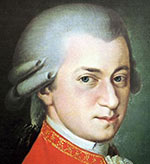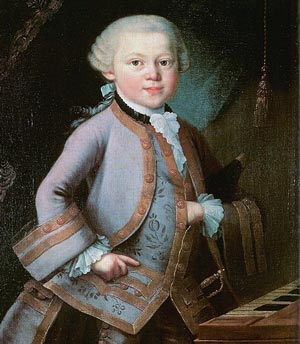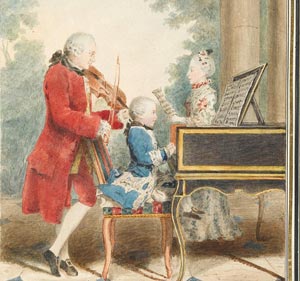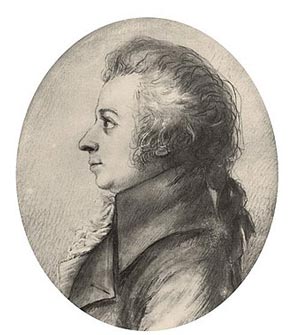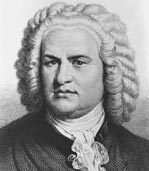моцарт
1 Моцарт
2 Моцарт
См. также в других словарях:
Моцарт — навсегда pour rêver Mozart Жанр драма Режиссёр Жан Люк Годар Продюсер Ален Сард Рут Вальдбюргер … Википедия
МОЦАРТ — центральный персонаж трагедии А.С.Пушкина «Моцарт и Сальери» (1830). Пушкинский М. столь же далек от реального Вольфганга Амадея Моцарта (1756 1791), сколь и весь сюжет трагедии, основанный на легенде (ныне опровергнутой), будто Моцарт был… … Литературные герои
Моцарт — (неправильно Моцарт) … Словарь трудностей произношения и ударения в современном русском языке
Моцарт — (Johaun Chrisostomus Wolfgang Amadeus Mozart) знаменитыйнемецкий композитор, род. в Зальцбурге 27 янв. 1756 г., ум. 5 дек. 1791г. в Вене. Уже в раннем детстве М. поражал феноменальным музыкальнымразвитием; трех лет от роду он играл на клавесине,… … Энциклопедия Брокгауза и Ефрона
Моцарт В. — Вольфганг Амадей Моцарт Wolfgang Amadeus Mozart Полное имя Йоганн Хризостом Вольфганг Теофил Моцарт Дата рождения 27 января 1756 Место рождения Зальцбург … Википедия
Моцарт В. А. — Вольфганг Амадей Моцарт Wolfgang Amadeus Mozart Полное имя Йоганн Хризостом Вольфганг Теофил Моцарт Дата рождения 27 января 1756 Место рождения Зальцбург … Википедия
Моцарт В. А. — (Mozart) Вольфганг Амадей (Иоанн Хризостом Вольфганг Теофиль; лат. имя греч. происхождения Theophilus и позднее лат. Amadeus, или Amade) (27 I 1756, Зальцбург 5 XII 1791, Вена) австр. композитор. Большое влияние на муз. развитие М … Музыкальная энциклопедия
Моцарт — (Mozart) Вольфганг Амадей (27.1.1756, Зальцбург, 5.12.1791, Вена), австрийский композитор. Среди величайших мастеров музыки М. выделяется ранним расцветом мощного и всестороннего дарования, необычностью жизненной судьбы от триумфов… … Большая советская энциклопедия
МОЦАРТ — (Вольфганг Амадей М. (1756 1791) великий австрийский композитор) Палатка. Разбросаны карты. Гадалка, смуглее июльского дня, Бормочет, монетой звеня, Слова слаще звуков Моцарта. Цит. АБ905 (II,66); Ах, звуков Моцарта светлы лобзанья, Как дали… … Собственное имя в русской поэзии XX века: словарь личных имён
Моцарт А. — Анна Мария Моцарт. Автор неизвестен,1775? Анна Мария Вальбурга Моцарт (нем. Anna Maria Walburga Mozart, в девичестве Пертль; 1720 1778) мать Вольфганга Амадея Моцарта, родилась в Санкт Гилгене (Австрия) у Евы Розины и Николауса Пертля, префекта… … Википедия
Моцарт А. М. — Анна Мария Моцарт. Автор неизвестен,1775? Анна Мария Вальбурга Моцарт (нем. Anna Maria Walburga Mozart, в девичестве Пертль; 1720 1778) мать Вольфганга Амадея Моцарта, родилась в Санкт Гилгене (Австрия) у Евы Розины и Николауса Пертля, префекта… … Википедия
МОЦАРТ
1 Mozart
См. также в других словарях:
Моцарт — навсегда pour rêver Mozart Жанр драма Режиссёр Жан Люк Годар Продюсер Ален Сард Рут Вальдбюргер … Википедия
МОЦАРТ — центральный персонаж трагедии А.С.Пушкина «Моцарт и Сальери» (1830). Пушкинский М. столь же далек от реального Вольфганга Амадея Моцарта (1756 1791), сколь и весь сюжет трагедии, основанный на легенде (ныне опровергнутой), будто Моцарт был… … Литературные герои
Моцарт — (неправильно Моцарт) … Словарь трудностей произношения и ударения в современном русском языке
Моцарт — (Johaun Chrisostomus Wolfgang Amadeus Mozart) знаменитыйнемецкий композитор, род. в Зальцбурге 27 янв. 1756 г., ум. 5 дек. 1791г. в Вене. Уже в раннем детстве М. поражал феноменальным музыкальнымразвитием; трех лет от роду он играл на клавесине,… … Энциклопедия Брокгауза и Ефрона
Моцарт В. — Вольфганг Амадей Моцарт Wolfgang Amadeus Mozart Полное имя Йоганн Хризостом Вольфганг Теофил Моцарт Дата рождения 27 января 1756 Место рождения Зальцбург … Википедия
Моцарт В. А. — Вольфганг Амадей Моцарт Wolfgang Amadeus Mozart Полное имя Йоганн Хризостом Вольфганг Теофил Моцарт Дата рождения 27 января 1756 Место рождения Зальцбург … Википедия
Моцарт В. А. — (Mozart) Вольфганг Амадей (Иоанн Хризостом Вольфганг Теофиль; лат. имя греч. происхождения Theophilus и позднее лат. Amadeus, или Amade) (27 I 1756, Зальцбург 5 XII 1791, Вена) австр. композитор. Большое влияние на муз. развитие М … Музыкальная энциклопедия
Моцарт — (Mozart) Вольфганг Амадей (27.1.1756, Зальцбург, 5.12.1791, Вена), австрийский композитор. Среди величайших мастеров музыки М. выделяется ранним расцветом мощного и всестороннего дарования, необычностью жизненной судьбы от триумфов… … Большая советская энциклопедия
МОЦАРТ — (Вольфганг Амадей М. (1756 1791) великий австрийский композитор) Палатка. Разбросаны карты. Гадалка, смуглее июльского дня, Бормочет, монетой звеня, Слова слаще звуков Моцарта. Цит. АБ905 (II,66); Ах, звуков Моцарта светлы лобзанья, Как дали… … Собственное имя в русской поэзии XX века: словарь личных имён
Моцарт А. — Анна Мария Моцарт. Автор неизвестен,1775? Анна Мария Вальбурга Моцарт (нем. Anna Maria Walburga Mozart, в девичестве Пертль; 1720 1778) мать Вольфганга Амадея Моцарта, родилась в Санкт Гилгене (Австрия) у Евы Розины и Николауса Пертля, префекта… … Википедия
Моцарт А. М. — Анна Мария Моцарт. Автор неизвестен,1775? Анна Мария Вальбурга Моцарт (нем. Anna Maria Walburga Mozart, в девичестве Пертль; 1720 1778) мать Вольфганга Амадея Моцарта, родилась в Санкт Гилгене (Австрия) у Евы Розины и Николауса Пертля, префекта… … Википедия
Wolfgang Amadeus Mozart
Our editors will review what you’ve submitted and determine whether to revise the article.
Wolfgang Amadeus Mozart (1756–91) was an Austrian composer. Mozart composed music in several genres, including opera and symphony. His most famous compositions included the motet Exsultate, Jubilate, K 165 (1773), the operas The Marriage of Figaro (1786) and Don Giovanni (1787), and the Jupiter Symphony (1788). In all, Mozart composed more than 600 pieces of music. Today he is widely considered one of the greatest composers in the history of Western music.
Mozart was a child prodigy. His father—a talented violinist—taught him basic notes on the harpsichord. Mozart composed his first piece of music in 1761, at age five; by age six, he had performed before two imperial courts. In 1763 Mozart and his sister, Maria Anna (”Nannerl”), went on tour. For three years the siblings toured western Europe, performing in major cities such as Munich, Augsburg, Paris, and London. In Paris Mozart published his first piece of music, and in London he composed his first symphony. After the tour concluded in 1766, Mozart went to Vienna, where he composed a German singspiel (Bastien und Bastienne) and an Italian opera buffa (La finta semplice). In 1769, 13-year-old Mozart was appointed honorary Konzertmeister at the Salzburg court.
Mozart wrote in all the popular genres of his time, and he excelled in every one. He wrote several successful operas, including The Marriage of Figaro (1786), Don Giovanni (1787), and The Magic Flute (1791). Mozart also composed a number of symphonies and sonatas. His last symphony—the Jupiter Symphony—is perhaps his most famous. Mozart completed the Jupiter Symphony in 1788, just three years before his death. At his death, Mozart left incomplete his Requiem in D Minor, K 626. The requiem was later completed by Mozart’s student, Franz Xaver Süssmayr.
Mozart was not a revolutionary musician. He rarely experimented with musical form, and he often recycled successful structural formulations in his work. In short, Mozart did not innovate. He mastered. He perfected existing forms and, in so doing, raised the symphony, sonata, and opera to new heights. His later compositions, especially, highlight his versatility and dexterity as a musician. They also showcase his ability to convey feeling through music. Mozart’s immediate successor, Ludwig van Beethoven, expanded on his work. Beethoven, unlike Mozart, did not resist experimenting with form.
Wolfgang Amadeus Mozart, in full Johann Chrysostom Wolfgang Amadeus Mozart, baptized as Johannes Chrysostomus Wolfgangus Theophilus Mozart, (born January 27, 1756, Salzburg, archbishopric of Salzburg [Austria]—died December 5, 1791, Vienna), Austrian composer, widely recognized as one of the greatest composers in the history of Western music. With Haydn and Beethoven he brought to its height the achievement of the Viennese Classical school. Unlike any other composer in musical history, he wrote in all the musical genres of his day and excelled in every one. His taste, his command of form, and his range of expression have made him seem the most universal of all composers; yet, it may also be said that his music was written to accommodate the specific tastes of particular audiences.
Early life and works
Mozart most commonly called himself Wolfgang Amadé or Wolfgang Gottlieb. His father, Leopold, came from a family of good standing (from which he was estranged), which included architects and bookbinders. Leopold was the author of a famous violin-playing manual, which was published in the very year of Mozart’s birth. His mother, Anna Maria Pertl, was born of a middle-class family active in local administration. Mozart and his sister Maria Anna (“Nannerl”) were the only two of their seven children to survive.
The boy’s early talent for music was remarkable. At three he was picking out chords on the harpsichord, at four playing short pieces, at five composing. There are anecdotes about his precise memory of pitch, about his scribbling a concerto at the age of five, and about his gentleness and sensitivity (he was afraid of the trumpet). Just before he was six, his father took him and Nannerl, also highly talented, to Munich to play at the Bavarian court, and a few months later they went to Vienna and were heard at the imperial court and in noble houses.
“The miracle which God let be born in Salzburg” was Leopold’s description of his son, and he was keenly conscious of his duty to God, as he saw it, to draw the miracle to the notice of the world (and incidentally to profit from doing so). In mid-1763 he obtained a leave of absence from his position as deputy Kapellmeister at the prince-archbishop’s court at Salzburg, and the family set out on a prolonged tour. They went to what were all the main musical centres of western Europe—Munich, Augsburg, Stuttgart, Mannheim, Mainz, Frankfurt, Brussels, and Paris (where they remained for the winter), then London (where they spent 15 months), returning through The Hague, Amsterdam, Paris, Lyon, and Switzerland, and arriving back in Salzburg in November 1766. In most of these cities Mozart, and often his sister, played and improvised, sometimes at court, sometimes in public or in a church. Leopold’s surviving letters to friends in Salzburg tell of the universal admiration that his son’s achievements aroused. In Paris they met several German composers, and Mozart’s first music was published (sonatas for keyboard and violin, dedicated to a royal princess); in London they met, among others, Johann Christian Bach, Johann Sebastian Bach’s youngest son and a leading figure in the city’s musical life, and under his influence Mozart composed his first symphonies—three survive (K 16, K 19, and K 19a—K signifying the work’s place in the catalog of Ludwig von Köchel). Two more followed during a stay in The Hague on the return journey (K 22 and K 45a).
After little more than nine months in Salzburg the Mozarts set out for Vienna in September 1767, where (apart from a 10-week break during a smallpox epidemic) they spent 15 months. Mozart wrote a one-act German singspiel, Bastien und Bastienne, which was given privately. Greater hopes were attached to his prospect of having an Italian opera buffa, La finta semplice (“The Feigned Simpleton”), done at the court theatre—hopes that were, however, frustrated, much to Leopold’s indignation. But a substantial, festal mass setting (probably K 139/47a) was successfully given before the court at the dedication of the Orphanage Church. La finta semplice was given the following year, 1769, in the archbishop’s palace in Salzburg. In October Mozart was appointed an honorary Konzertmeister at the Salzburg court.
Still only 13, Mozart had by now acquired considerable fluency in the musical language of his time, and he was especially adept at imitating the musical equivalent of local dialects. The early Paris and London sonatas, the autographs of which include Leopold’s helping hand, show a childlike pleasure in patterns of notes and textures. But the London and The Hague symphonies attest to his quick and inventive response to the music he had encountered, as, with their enrichment of texture and fuller development, do those he produced in Vienna (such as K 43 and, especially, K 48). And his first Italian opera shows a ready grasp of the buffo style.
МОЦАРТ
1 Mozart
См. также в других словарях:
Моцарт — навсегда pour rêver Mozart Жанр драма Режиссёр Жан Люк Годар Продюсер Ален Сард Рут Вальдбюргер … Википедия
МОЦАРТ — центральный персонаж трагедии А.С.Пушкина «Моцарт и Сальери» (1830). Пушкинский М. столь же далек от реального Вольфганга Амадея Моцарта (1756 1791), сколь и весь сюжет трагедии, основанный на легенде (ныне опровергнутой), будто Моцарт был… … Литературные герои
Моцарт — (неправильно Моцарт) … Словарь трудностей произношения и ударения в современном русском языке
Моцарт — (Johaun Chrisostomus Wolfgang Amadeus Mozart) знаменитыйнемецкий композитор, род. в Зальцбурге 27 янв. 1756 г., ум. 5 дек. 1791г. в Вене. Уже в раннем детстве М. поражал феноменальным музыкальнымразвитием; трех лет от роду он играл на клавесине,… … Энциклопедия Брокгауза и Ефрона
Моцарт В. — Вольфганг Амадей Моцарт Wolfgang Amadeus Mozart Полное имя Йоганн Хризостом Вольфганг Теофил Моцарт Дата рождения 27 января 1756 Место рождения Зальцбург … Википедия
Моцарт В. А. — Вольфганг Амадей Моцарт Wolfgang Amadeus Mozart Полное имя Йоганн Хризостом Вольфганг Теофил Моцарт Дата рождения 27 января 1756 Место рождения Зальцбург … Википедия
Моцарт В. А. — (Mozart) Вольфганг Амадей (Иоанн Хризостом Вольфганг Теофиль; лат. имя греч. происхождения Theophilus и позднее лат. Amadeus, или Amade) (27 I 1756, Зальцбург 5 XII 1791, Вена) австр. композитор. Большое влияние на муз. развитие М … Музыкальная энциклопедия
Моцарт — (Mozart) Вольфганг Амадей (27.1.1756, Зальцбург, 5.12.1791, Вена), австрийский композитор. Среди величайших мастеров музыки М. выделяется ранним расцветом мощного и всестороннего дарования, необычностью жизненной судьбы от триумфов… … Большая советская энциклопедия
МОЦАРТ — (Вольфганг Амадей М. (1756 1791) великий австрийский композитор) Палатка. Разбросаны карты. Гадалка, смуглее июльского дня, Бормочет, монетой звеня, Слова слаще звуков Моцарта. Цит. АБ905 (II,66); Ах, звуков Моцарта светлы лобзанья, Как дали… … Собственное имя в русской поэзии XX века: словарь личных имён
Моцарт А. — Анна Мария Моцарт. Автор неизвестен,1775? Анна Мария Вальбурга Моцарт (нем. Anna Maria Walburga Mozart, в девичестве Пертль; 1720 1778) мать Вольфганга Амадея Моцарта, родилась в Санкт Гилгене (Австрия) у Евы Розины и Николауса Пертля, префекта… … Википедия
Моцарт А. М. — Анна Мария Моцарт. Автор неизвестен,1775? Анна Мария Вальбурга Моцарт (нем. Anna Maria Walburga Mozart, в девичестве Пертль; 1720 1778) мать Вольфганга Амадея Моцарта, родилась в Санкт Гилгене (Австрия) у Евы Розины и Николауса Пертля, префекта… … Википедия
Biography Online
Mozart Biography
Wolfgang Amadeus Mozart (27 January 1756 – 5 December 1791) was one of the most influential, popular and prolific composers of the classical period. A child prodigy, from an early age he began composing over 600 works, including some of the most famous pieces of symphonic, chamber, operatic, and choral music.
“Music is my life and my life is music. Anyone who does not understand this is not worthy of God.”
– Wolfgang Amadeus Mozart.
Short Biography of Mozart
Mozart was born in Salzburg to a musical family. From an early age, the young Mozart showed all the signs of a prodigious musical talent. By the age of five, he could read and write music, and he would entertain people with his talents on the keyboard. By the age of six, he was writing his first compositions, and by the age of eight had composed his first symphony. Mozart was generally considered to be a rare musical genius, although he was also diligent in studying other great composers such as Haydn and Bach.
His father Leopold, who was also a musician, was quick to see the talent of his young son and became a formidable publicist in showing off his son’s capacities. During his childhood, Mozart was a frequent guest at various palaces around Europe, playing for distinguished guests. In addition to being feted by aristocrats across, Europe, Leopold raised his children as strict Catholics. This included attendance at mass, frequent confession and the veneration of saints. Mozart remained a committed Catholic throughout his life.
Mozart family on tour
Dressed in the finest clothes, the child-genius Mozart left an indelible impression on everyone he met. One of the pre-eminent composers of the day Johann Hasse remarked: “He has done things which for such as age are really incomprehensible; they would be astonishing in an adult.”
Aged 17, he accepted a post as a court musician in Salzburg; although this did not suit him very well. He chaffed at the lack of independence from his patron Prince-Archbishop Hieronymus Colloredo (the ruler of Salzburg). Mozart was also indignant at his meagre salary (150 florins a year) which left Mozart feeling unappreciated. Yet, despite dissatisfaction and getting involved in rows, the next few years were a time of prolific composition. In 1777, he grew tired of the demands placed on him by his patron and negotiated the release from his contract. He left Salzburg and after travelling to Paris and Germany, he moved permanently to Vienna, Austria where he lived for the remainder of his life.
Initially, Mozart worked for Archbishop Colloredo, but again Mozart felt constrained by the unreasonable demands and limitations placed on him by the Archbishop. For example, the Archbishop sought to prevent Mozart from playing in public concerts. Mozart became angry at these restrictions and confronted the archbishop. Eventually, he was released from his contact with a ‘literal kick up the backside.’ It was a difficult decision because his father sided with the archbishop and felt his son should seek to reconcile with the archbishop. Some biographers see this as an important moment in Mozart’s life as – in a very clear way – Mozart asserted his musical independence even at the cost of his relationship with his father and his financial security.
In Vienna, he became well known and was often in demand as a composer and performer. His dazzling and innovative new compositions were generally admired, although, like many genii, he was ahead of his time. Some criticised his symphonies for being too complicated, however, he received the very sincere praise of all the great composers of the era. Schubert said of Mozart:
“O Mozart! immortal Mozart! What countless impressions of a brighter, better life hast thou stamped upon our souls!”
On a personal level, his strained relationship with his domineering father left Mozart often seeking outer recognition. However, in the realm of music, Mozart was in his own world, he was not constrained by the petty misunderstandings and expectations of society.
“I pay no attention whatever to anybody’s praise or blame. I simply follow my own feelings.”
Drawing of Mozart by Dora Stock, Dresden, April 1789
However, despite his relative fame, he struggled to manage his finances and moved between periods of poverty and prosperity. A trait of Mozart’s character was that he could be frivolous with money; he enjoyed spending on fancy clothes – as soon as he received money he could spend it and he was frequently in debt. Another aspect of Mozart’s character was a playfulness and high-spirits, which could also appear like childishness. He enjoyed pranks and a rough sense of humour, and his care-free attitude could get him into difficulties with the more serious-minded court officials. Yet, Mozart was a man of great contrast and counterpoint. The one moment he could be making a crude joke, the next he could be composing the most sublime and divine music.
Personal life
In 1782, he married Constanze – against the wishes of his father. He remained very close to her for the rest of his life and was very much in love. They had six children but only two survived infancy. Whilst he got closer to Constanze, his relationship with his father deteriorated. His father had been domineering since his childhood, and Mozart increasingly resented his presence.
Early fortepiano played by Mozart
His financial difficulties were enhanced in 1786 when Austria was involved in a war which led to lower demand for musicians. Mozart wrote many letters begging for support from patrons, friends and fellow freemasons. He received only scattered support and supplemented his income by teaching and performing his works.
Death and requiem
In the last year of his life, he began composing one of his greatest works – The Requiem. Mozart died before he could finish. Reasons for his death are not clear. The most likely is a sudden illness – possibly the plague or possibly a combination of rheumatoid arthritis and pneumonia. One legend is that he was poisoned by a jealous rival composer Salieri, but this theory is discredited..
His last major work the Requiem was commissioned by Count Franz von Walsegg for his wife who past away. Walsegg may have tried to pass it off as his own work, but a public benefit concert for Constanze frustrated his aim. Many took the Requiem to be autobiographical and written by Mozart for his own life.
Mozart was near bankrupt when he died and he was given a modest burial of a citizen. It was not a pauper’s grave as sometimes claimed. But, in those days, 10 years after burial a citizens grave could be dug up and re-used.
The music of Mozart
The work of Mozart is epic in scope and proportion. There were few branches of music Mozart did not touch. He composed operas, symphonies, concertos, and solo pieces for the piano. His work spanned from joyful light-hearted pieces to powerful, challenging compositions which touched the emotions. At the beginning of his career, Mozart had a powerful ability to learn and remember from the music he heard from others. He was able to incorporate the style and music of people such as Haydn and J.S. Bach. As he matured, he developed his very own style and interpretations. In turn, the music of Mozart very much influenced the early Beethoven.
Mozart was brought up a Roman Catholic and remained a member of the church throughout his life.
“I know myself, and I have such a sense of religion that I shall never do anything which I would not do before the whole world.”
Some of his greatest works are religious in nature such as Ave Verum Corpus and the final Requiem.
Mozart was very productive until his untimely death in 1791, aged 35.
“I never lie down at night without reflecting that young as I am I may not live to see another day.”
In the last year of his life, he composed the opera The Magic Flute, the final piano concerto (K. 595 in B-flat), the Clarinet Concerto K. 622, a string quintet (K. 614 in E-flat), the famous motet Ave Verum Corpus K. 618, and the unfinished Requiem K. 626.
Mozart – 100 Classical Masterpieces
Mozart: A Life
Related pages
Famous Composers – A list of famous and influential composers throughout history, including the greatest composers, such as Bach, Mozart, and Beethoven.
Famous Austrians. Famous Austrians, including Marie Antoinette, Sigmund Freud and musicians, such as Mozart, Franz Liszt, Schubert. Also Austrian political figures.
People who changed the world – Famous people who changed the course of history including Socrates, Newton, Jesus Christ, Muhammad, Queen Victoria, Catherine the Great, Einstein and Gandhi.







